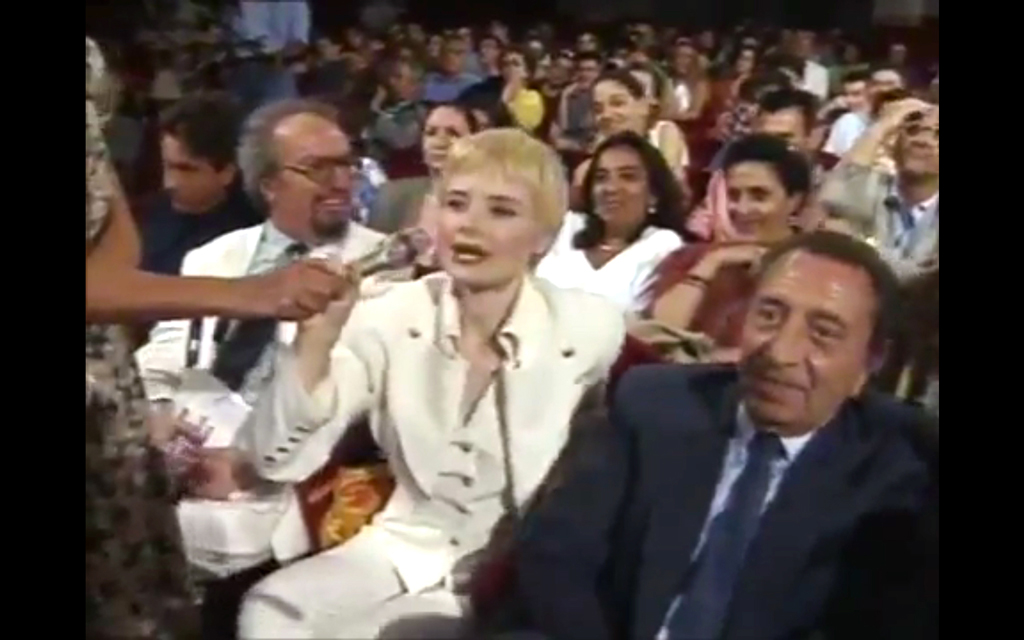[ad_1]
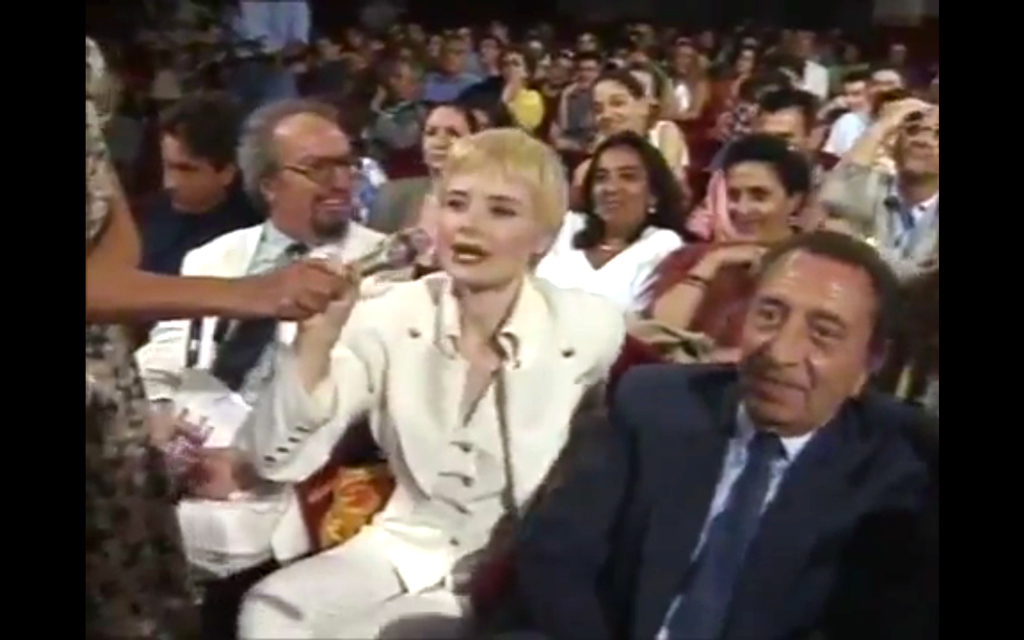
Still from the Maurizio Costanzo Show segment “Uno contro tutti,” Finisca l’esibizione! (Finish the show!), 44:51, June 27, 1994, television.
RAI3, ROME
TUESDAY, MAY 29
Performance: Michèle Graf and Selina Grüter at Whitney Museum
For “One Against All (Uno Contro Tutti),” artists Michèle Graf and Selina Grüter reenact an episode of the Maurizio Costanzo Show, an Italian talk show that has aired since 1982. A segment on the show called “Uno Contro Tutti” spotlights guests with polarizing opinions on social and political issues who answer questions from journalists and other audience members. In their practice, Graf and Grüter often reconsider cultural objects outside of their original contexts, and their reexamination of “Uno Contro Tutti” series, in presenting irreconcilable ideologies as a sort of spectacle, feels particularly relevant in the United States today. (The performance is organized as part of the duo’s inclusion in a group exhibition, “Omnipresence,” at the Kitchen, which is curated by a group of Whitney Independent Study Program fellows.)
Whitney Museum of American Art, 99 Gansevoort Street, 6:30 p.m. Tickets $6/$8
THURSDAY, MAY 31
Opening: Erin M. Riley at P.P.O.W.
“Used Tape,” fiber artist Erin M. Riley’s first solo-show at P.P.O.W., features large-scale tapestries that grapple with intimacy, memories, fantasy, sexual violence, and trauma. The artist sourced some of the imagery in her textile works from personal and found photographs, and many pieces on view at the gallery—including an eleven-foot-tall weaving of a rape kit—address abuse and assault. Riley’s own experience with assault and violence lends much of her work an autobiographical quality. The artist borrows the phrase “used tape” from abstinence-only curricula, wherein students are taught that premarital sex inhibits a person from forming long-lasting, meaningful bonds. In this way, Riley’s work also serves as a commentary on the effects of societal shame surrounding sexuality, particularly when that shame, and often blame, is unfairly placed upon women.
P.P.O.W. Gallery, 535 W 22nd Street, 6-8 p.m.
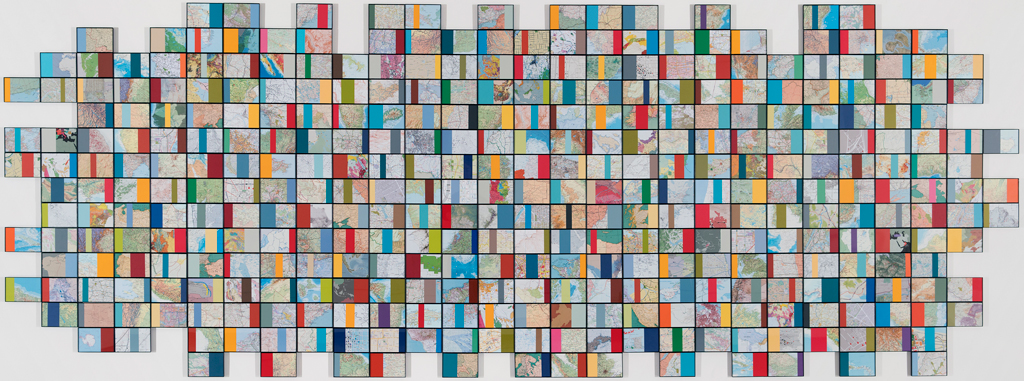
Nayda Collazo-Llorens, Geo Dis/connect #3, 2017, wall installation with found maps.
COURTESY THE ARTIST AND LMAKGALLERY, NEW YORK
Opening: “Relational Undercurrents: Contemporary Art of the Caribbean Archipelago” at Wallach Art Gallery
Bringing together painting, installation, sculpture, photography, video, and performance work by Caribbean artists, “Relational Undercurrents” focuses on continuities in artworks from the archipelago. The exhibition was recently staged at the Museum of Latin American Art in Long Beach, California, as part of the Getty Foundation’s Pacific Standard Time: LA/LA initiative, and its inclusion in that program was notable as art from the Caribbean has historically been marginalized within broader discourses of Latin American and Latinx art. The show takes on new relevance in New York, which has significant populations of people with Caribbean heritage. On the whole, “Relational Undercurrents”—divided into four sections: “Conceptual Mappings,” “Perpetual Horizons,” “Landscape Ecologies,” and “Representational Acts”—pushes back against notions of Caribbean fragmentation by inviting a dialogue between Hispanophone, Anglophone, Francophone, Dutch, and Danish artists. The show is curated by Tatiana Flores, an associate professor of art history and Latino and Caribbean studies at Rutgers University.
Wallach Art Gallery, 615 West 129th Street, 6-8 p.m.
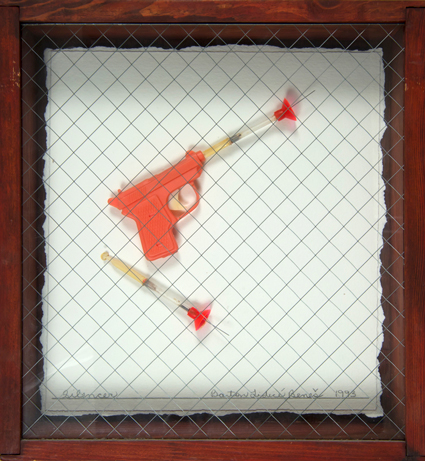
Barton Lidicé Beneš, Lethal Weapons: Silencer, 1994, mixed-media assemblage with artist’s HIV-positive blood.
COURTESY THE ESTATE OF BARTON LIDICÉ BENEŠ AND PAVEL ZOUBOK GALLERY, NEW YORK/COLLECTION OF JOSHUA RECHNITZ
Opening: “Cell Count” at La MaMa Galleria
Exploring the ways in which medicine has been inextricably linked to violence and incarceration throughout American history, “Cell Count” focuses on the ways in which the criminalization of HIV has resulted in over 300 prosecutions in the last ten years. (In many states today, it is still illegal to not disclose to a partner if one is HIV-positive.) The exhibition’s title doubles as a reference to one’s T-cell counts, an indicator of the virus’s impact on one’s immune system, and features work by Jordan Arseneault, Barton Lidicé Beneš, Doreen Garner, Alexander McClelland, Muhjah Shakir, and Chris Vargas, among others, which wrestles with that history of HIV criminalization. “Cell Count” is curated by Kyle Croft and Asher Mones for Visual AIDS, a New York-based nonprofit that uses art to fight, raise awareness of, and start conversations about AIDS. The exhibition is accompanied by a catalogue with essays by Che Gossett, Theodore Kerr, and Risa Puleo, among others.
La MaMa Galleria, 47 Great Jones Street, 6-8 p.m.
Screening: Early Films by Harun Farocki at Anthology Film Archives
This event will include a number of early works from Farocki, the late German filmmaker who was known for his experimental, essayistic documentary films. This screening is part of a larger Anthology series, “1968 On Screen,” which focuses on the cultural and political upheaval of the program’s titular year. including the 16mm piece Inextinguishable Fire, which was made in 1969 and takes a look at the the manufacturing process behind the deadly chemical napalm.
Anthology Film Archives, 32 Second Avenue, 8:45 p.m., $11
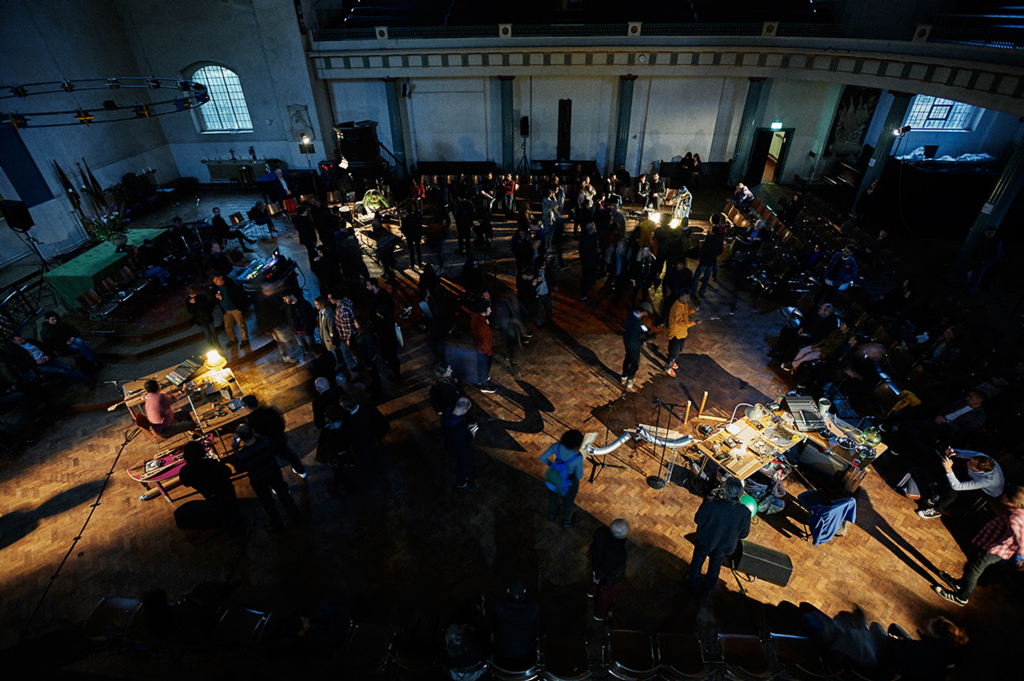
View of a 2011 performance by Marginal Consort.
KEIKO HIGUCHI
FRIDAY, JUNE 1
Performance: Marginal Consort at Pioneer Works
Formed in 1996 by students of the legendary Fluxus artist Takehisa Kosugi, the Japanese improv collective Marginal Consort trade in a sui generis durational performance style. Lasting somewhere in the realm of two-to-four hours, their pieces here scatter performers around the space and utilize a range of home-brewed instruments in the creation of a classically avant-informed racket. This performance, as well as another two days later in Los Angeles, marks a rare break from the group’s usual singular yearly concert schedule. The program, which is co-presented by blank forms, is their debut in the United States.
Pioneer Works, 159 Pioneer Street, Brooklyn, 8 p.m.
Symposium: “Removing Public Art” at the SVA Theatre
This action-packed program on a bracingly relevant issue—the annual symposium of the Madison Square Park Conservancy, presented with the School of Visual Arts—includes a conversation between artist Alison Saar and Julián Zugazagoitia, the director of the Nelson-Atkins Museum of Art in Kansas City; a conversation moderated by New York Times art critic Jason Fargo that features artist Melvin Edwards alongside major museum leaders and scholars; and presentations by artists Diana Al-Hadid (whose work is currently on view in the park) and Arlene Shechet (whose work will be there in September), as well as Bryan C. Lee, Jr., the founder of Paper Monuments, a New Orleans-based nonprofit focused on rethinking how history is memorialized in the city.
SVA Theatre, 333 West 23rd Street, 9 a.m.–12 p.m., free, RSVP required to symposium@madisonsquarepark.org.
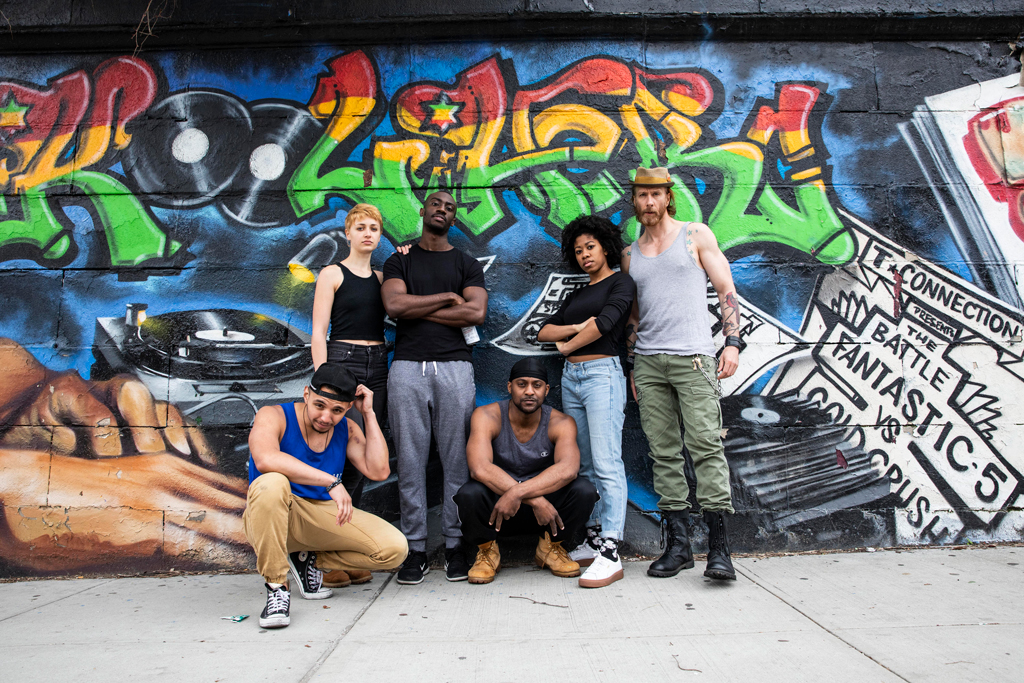
The cast of This Is Modern Art, 2018.
©MARIA BARANOVA
SATURDAY, JUNE 2
Play: This Is Modern Art at Next Door at New York Theatre Workshop
“This Is Modern Art” is inspired by a 2010 incident at the Art Institute of Chicago wherein a group of disaffected young graffiti writers tagged a wall in the institution’s modern wing, as a way to question the often-exclusive nature of museums and the underlying politics of who gets to display their work in such spaces. Making its New York premiere, the play, written by Idris Goodwin and Kevin Coval and directed here by Jessica Burr, will be performed by the experimental theater ensemble Blessed Unrest and features an original piece created for the production by New York street artist KEO XMEN. The play is staged as part of the debut season of programming at Next Door, the New York Theater Workshop’s new 65-seat black box space.
Next Door at New York Theatre Workshop, 79 E. 4th, 7 p.m., $20
SUNDAY, JUNE 3
Exhibition: Reza Abdoh at MoMA PS1
In his short career, the late Iranian-American theater director Reza Abdoh, who died of AIDS–related causes in 1995, amassed an influential body of work inspired by everything from video art and avant-garde theater to the subcultural language of raves and BDSM. This exhibition, curated by Klaus Biesenbach with Negar Azimi, Tiffany Malakooti, and Babak Radboy of Middle Eastern art nonprofit Bidoun, will present video works and an installation based around Abdoh’s 1991 production Bogeyman. The artist’s first large-scale retrospective will also include ephemera related to the AIDS crisis, the culture wars of the 1980s and ’90s, and the club scenes of New York and Los Angeles. The opening day of the exhibition, part of PS1’s Summer Open House, will also include four actors from Abdoh’s original company reading excerpts of three of his plays and from an unrealized adaption of a Faust legend.
MoMA PS1, 22-25 Jackson Avenue, Queens, 12–6 p.m., reading at 5 p.m.
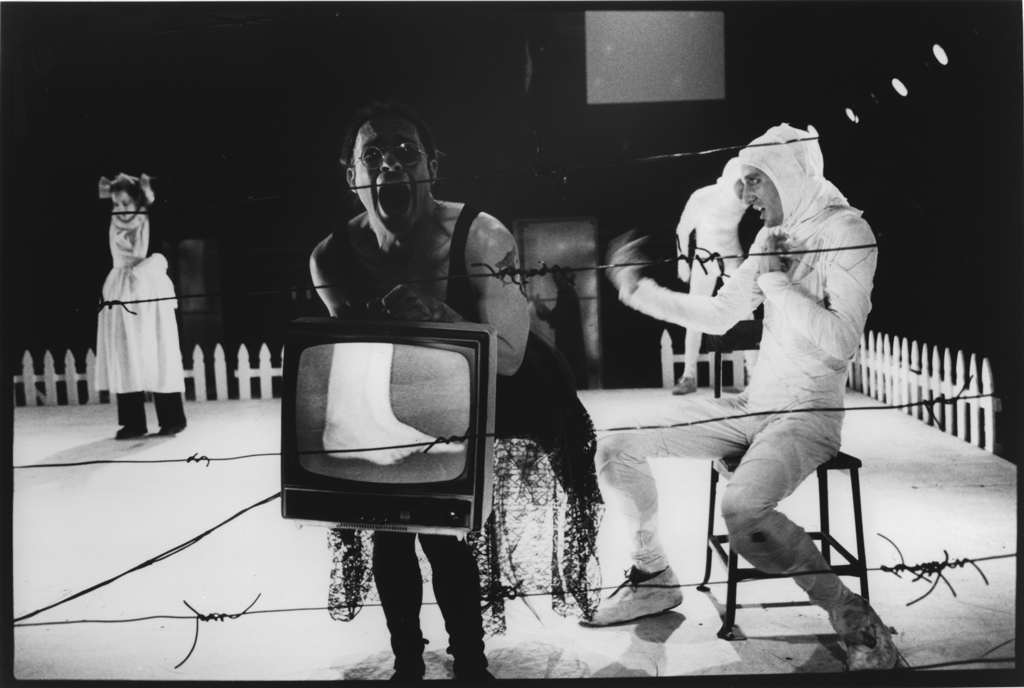
Performance view of Reza Abdoh’s Quotations From a Ruined City, 1994.
©PAULA COURT
Party: Good Boat with Nicky Siano at New York Skyport Marina, presented by Good Room
Brooklyn discotheque Good Room presents a three-hour sunset cruise along the New York City skyline with the legendary DJ Nicky Siano. It is called, naturally, Good Boat. Siano was a pioneering disco DJ, first at Chelsea club The Gallery and later at Studio 54. He is part of a generation of DJs whose technical innovations laid the groundwork for contemporary dance music; revelers will be in good hands with captain Siano manning the decks.
New York Skyport Marina, 2430 FDR Drive East Surface Road, 4:30 p.m. arrival, 5 p.m. departure, $30
[ad_2]
Source link

